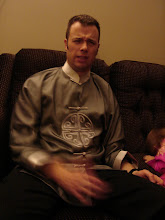(originally posted for Remembrance Day 2007)
Remembrance Day is coming up - always an interesting time for a pacifist, and especially a pacifist pastor of some not-so-pacifist but very beautiful people!I have a great deal of respect for those who took/take their duties to their country so seriously that they were willing to put their lives on the line for it. Their motives, in many cases, were noble. I'm also aware that pacifists (or whatever you want to call us) are lousy at honoring veterans.
Remembrance Day is coming up - always an interesting time for a pacifist, and especially a pacifist pastor of some not-so-pacifist but very beautiful people!I have a great deal of respect for those who took/take their duties to their country so seriously that they were willing to put their lives on the line for it. Their motives, in many cases, were noble. I'm also aware that pacifists (or whatever you want to call us) are lousy at honoring veterans.
That said, the rhetoric often used around Remembrance Day troubles me. "We need to honor those people who fought and died for our freedom." That is the line I often hear. Here are a few things I find troubling about it:
First, these people not only fought and sometimes died for the peace and freedom we enjoy; they also killed for it. Remembrance Day rhetoric tends to hide that fact.
Second, take a look at the peace and freedom we enjoy. Is it Good? Yes, in many ways it is. But would you ask someone to kill on your behalf so you could have this? I am glad we live in a democratic society, but is it that important? That peace and freedom which counts in the NT is that which was purchased for us by the Lord Jesus Christ when he chose to die at the hands of his enemies.
Third, as Christians our citizenship is first and foremost in the Kingdom of God - not Canada or any other country. If we take this at all seriously, we can never pray for just our veterans - we must also then pray for those whom our troops are fighting, and for the widows and orphans of the men whom our soldiers kill.
Fourth, as Christians we say we believe that we have peace with God and others through Jesus' sacrifice of his own life on the cross at the hands of his enemies. That kind of understanding of peace runs clean contrary to the rhetoric of the Pax Romana of the first century. According to the Empire, peace came to the people through the military might and administrative abilities of the Empire, symbolized in whoever the current Caesar was. For Paul to write to the Colossians (for example), "Grace and peace to you from God our Father" was to directly contradict the claims of the Empire. Is it too much to imagine that that Christian claim still runs contrary to what the world tells us about how peace is made and who makes it?
"What do I communicate to a man about the love of God by being willing to consider him an enemy? What do I say about personal responsibility by agreeing to consider him my enemy when it is only the hazard of birth that causes us to live under different flags? What do I say about forgiveness if I punish him for the sins of his rulers? How is it reconcilable with the gospel - good news - for the last word in my estimate of any man to be that, in a case of extreme conflict, it could be my duty to sacrifice his life for the sake of my nation, my security, or the political order which I prefer?" (J.H. Yoder, The Political Axioms of the Sermon on the Mount)
What do you think? What does it mean for followers of the crucified Lord to honor our veterans and take part in Remembrance Day?
Shalom (and I mean it),
David







11 comments:
Some good thoughts, Dave. What do we make of it when great evil is happening in the State, though?
Do we emulate men like Bonhoeffer and focus our energy on social and political solutions (like assassinating Hitler)? Or do we preach the Gospel of Christ and trust in it as the sole remedy to the world?
What would have happened do you think if the German church during WWII had been preaching the gospel with force and clarity? Would that have been as/more effective than the Neo-Orthodox/Social Activism hybrid that existed at the time?
Blessings,
Matt
thanks dave, for this. impacts me as much this year as it did last. you're a good man.
thanks for the brain food! i miss you.
Those are certainly thoughts I often have about Remembrance Day -- it is a tricky concept to somehow honour our veterans for their sacrifice, and yet not endorse what it is they are honoured for!! Remembering the film 'The Pacifist Who Went to War' from a few years ago, I remember the soldier-brother saying that Nov. 11 is always for him a day of grief -- at the wars fought and being fought -- and his hatred of war, even though he felt that he could not stay out of it in WWII.
David,
These are good (and important) words for Nov 11. I too want to remember and respect those who died in war (my uncle being one of them - I would've loved to know him). But your comments about the 'rhetoric' are sound. When I see a flag-draped casket brought back to Canadian soil I don't think 'hero', I think victim. A victim of a philosophy and a machine that has never accomplished its goals and never will. As Christians we are called to reconciliation and peace. Thanks for articulating with gentleness and respect.
Ward
Matt, when great evil is happening in the state, I think our call is the same as always; to simply be the church. As Stanley Hauerwas reminds us, the church does not have a social strategy - it is a social strategy. That means that preaching the gospel and shaping our lives around it as communities of X-followers must not be set up as an alternative to social and/or political solutions. The gospel is inherently social and political and is no gospel at all if its not - but its a politics of peace, of enemy love, of self-sacrifice.
As to the rest of your questions, i don't know how to answer b/c I don't know what you mean by the neo-orthodox/social activism hybrid, or what you mean by contrasting that to the gospel. What I think of when I hear the term neo-orthodox is very positive, exemplars of it being Karl Barth and Emil Brunner.
Preaching the gospel is necessary and crucial, but it doesn't matter if we're not living lives of sacrificial love - then it's just noisy gongs, clanging symbols.
Ward, I really like your comment re. seeing those who have died as victims rather than heroes. That makes a whole lot 'o sense.
Shalom,
David
Matt, when great evil is happening in the state, I think our call is the same as always; to simply be the church.
It sounds like we have agreement here.
The gospel is inherently social and political and is no gospel at all if its not
I might be able to agree with that. My concern is when the "gospel" adorns social and political concerns rather than vice versa. The gospel as I understand it is primarily about justification and peace with God. Of course that should and inevitably will shape other aspects of our life, but my concern is when "ministries" on both the political left and right spend their energy on politics and social reform and leave the gospel of grace until the end.
What I think of when I hear the term neo-orthodox is very positive, exemplars of it being Karl Barth and Emil Brunner.
Agree on the exemplars of neo-orthodoxy, but it may not surprise you that I may be less enthusiastic than you regarding how helpful neo-orthodoxy was. Those of us who are somewhat more conservative tend to favour Van Till, Schaeffer, or Geisler rather than Bonhoeffer, Brunner, or Barth. Some of your brothers in Christ would have the conviction that the neo-orthodoxists gave too much away to modernism/liberalism even as they were attempting to work against it. We might be inclined to believe that when our opponents set all the rules, and get us to play on their field, that the very best we can do is play to a tie, rather than truly penetrate with the gospel of Christ.
Preaching the gospel is necessary and crucial, but it doesn't matter if we're not living lives of sacrificial love - then it's just noisy gongs, clanging symbols.
Couldn't agree more. In fact I'd even go so far as question if orthopraxi is even possible in the absence of the gospel, or if it's just surface moralism.
Grace and peace in Jesus,
Matt
Oh, and in the whole discussion, I don't want it to be diminished that I find your original post to be helpful and well written.
Blessings,
Matt
Thanks, Matt - that's gracious of you.
Post a Comment